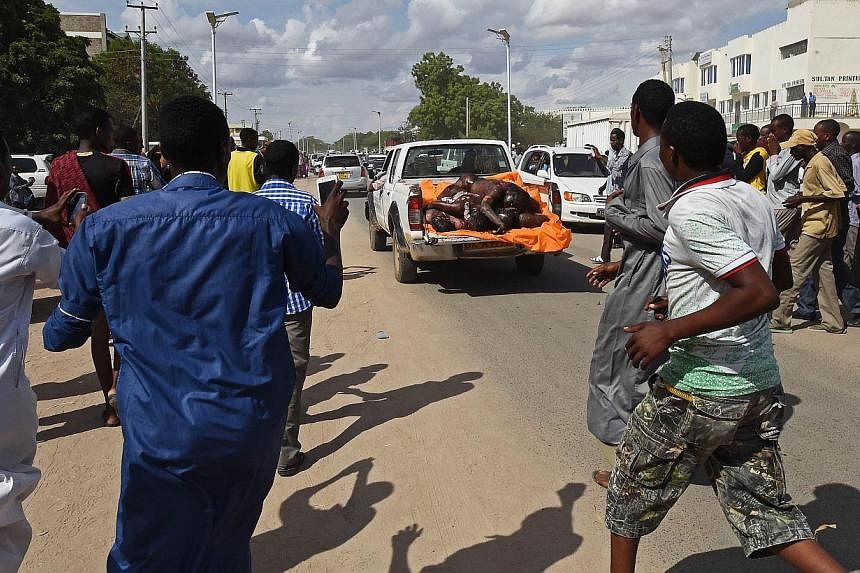GARISSA, Kenya (AFP) - Police on Saturday paraded the naked corpses of Somali Al-Qaeda-linked Shebab gunmen who slaughtered almost 150 people in one of Kenya's worst massacres, hours after the militants threatened "another bloodbath".
Five men have been arrested in connection with Thursday's attack, where the gunmen staged a one-day seige at the university in the northeastern town of Garissa.
Earlier on Saturday, the Shebab warned of a "long, gruesome war" unless Kenya withdrew its troops from Somalia.
Meanwhile, President Uhuru Kenyatta declared three days of national mourning.
Hours after Shebab's warning, police paraded four corpses piled on top of each other face down in the back of a pick up truck followed by a huge crowd, saying the grim display was to see if anyone could identify the assailants.
But some threw stones at the bodies as they passed, others jeered and shouted at the dead.
Meanwhile, forensic investigators continued to scour the site where one student shocked security forces - who had said all students were accounted for - by emerging unharmed from a wardrobe where she had hidden for over two days.
A Kenya Red Cross spokeswoman said that the 19-year old was traumatised and dehydrated but physically unharmed and undergoing assessment by doctors.
Thursday's attack on Garissa University, situated near the border with Somalia, claimed 148 lives, including 142 students, three police officers and three soldiers.
TWO DAYS INSIDE WARDROBE
"Those children were our future, so part of our future has been destroyed," Foreign Minister Amina Mohamed said Friday.
Over 600 students from the now closed college on Saturday boarded buses for the home towns around the country.
The massacre was Kenya's deadliest attack since the 1998 bombing of the US embassy in Nairobi, and the bloodiest ever assault by the Shebab militants.
Interior ministry spokesman, Mwenda Njoka, said five arrests had already been made, including three "coordinators" captured as they fled towards Somalia, and two others in the university.
The name of the three suspected organisers were not given, but Njoka said the two arrested on campus included a security guard at the university, and a Tanzanian named as Rashid Charles Mberesero.
"He was hiding in the ceiling of the university and had grenades," Njoka said, while the guard, a Kenyan of ethnic Somali origin, was named as Osman Ali Dagane.
He is suspected of helping the gunmen, and was found "in possession of jihadist materials," Njoka added.
SHEBAB THREAT
A US$215,000 (S$290,000) bounty has also been offered for alleged Shebab commander Mohamed Mohamud, a former Kenyan teacher believed to now be in Somalia and said to be the mastermind behind the Garissa attack.
Hurling grenades and firing automatic rifles, the gunmen stormed the university at dawn on Thursday as students were sleeping, shooting dead dozens before setting Muslims free and holding Christians and others hostage.
Just before darkness fell, Kenyan troops moved in on the dormitory where the gunmen were holed up, apparently determined to prevent a drawn-out siege like that seen in the Westgate shopping mall in Nairobi in September 2013, also carried out by Shebab fighters.
The militants vowed more attacks against Kenya, which invaded southern Somalia in 2011 and is now fighting alongside the African Union force battling the Shebab.
"We will... stop at nothing to avenge the deaths of our Muslim brothers until your government ceases its oppression and until all Muslim lands are liberated from Kenyan occupation," the Shebab said in a statement released Saturday.
"Until then, Kenyan cities will run red with blood... this will be a long, gruesome war of which you, the Kenyan public, are its first casualties."
On Friday, United States embassy vehicles were seen entering the campus. In past attacks, including the Westgate massacre, FBI investigators helped Kenyan police with forensic examinations.
"Forensics and investigations are still going on," Njoka said.
The Shebab on Friday described how they had specifically singled out non-Muslims to kill, gathering them together before executing them.
WARNINGS MISSED
Survivors who hid from the attack have recounted how the gunmen called on people to come out of their dormitory bedrooms and lie on the ground face down, but then killed them.
A photograph seen by AFP from inside the building showed over 50 students squeezed together lying down on the ground, all them apparently executed where they lay.
Survivors also recounted how the gunmen taunted students before killing them.
"The mujahedeen stormed the university compound and swiftly proceeded to the halls of residence where they had gathered all the occupants," the Shebab statement said.
"And since the attack targeted only non-Muslims, all Muslims were allowed to safely evacuate the premises before executing the disbelievers."
Emergency workers completed the task of collecting bodies on Friday, with the final toll declared as 148, with all the corpses flown to the capital Nairobi, where grieving families wait to receive the remains of their loved ones.
There has been growing criticism in the media that critical intelligence warnings were missed.
Kenya's National Union of Teachers have called for extra security measures, warning advising "all teachers in northen Kenya to leave if they feel unsafe."

